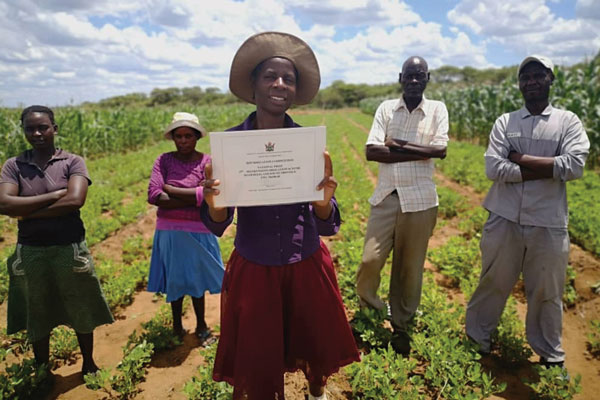

BY EVERSON MUSHAVA
IT was early February in Mankonkoni area of Gwanda South, Matabeleland South. The sun was unrelentingly hot. All around into the yonder horizon there was hardly any sign that the village had received a heavy downpour just a week before. With temperatures hovering above 33 °C the roads were so sun-baked that a thick cloud of dust rose behind our vehicle as it negotiated its way to Mankonkoni Irrigation Scheme along Shashe River which marks the Zimbabwe-Botswana border.
Lying in the ecological region five in the south westrern part of Zimbabwe, where erratic and sparsely distributed rainfall scarcely exceeds 650mm per year, Gwanda district and most parts of Matabeleland perennially experience food shortages.
But for the Mankonkoni community, the sun, which has for a long time been the biggest source of their misery, has become their new-found source of relief and hope.
The community is shaking off its vulnerability, thanks to the Mashaba solar mini-grid implemented by a group of non-governmental organisations with Practical Action as the lead partner and supported by SNV Netherlands Development Organisation, Hivos and the Dabane Trust.
The solar power initiative is part of a four-year €7,1 million project in Zimbabwe and Malawi under the European Development Fund (EDF). The EDF is a conduit for European Union (EU) aid for development cooperation in Africa, the Caribbean and Pacific (ACP Group) countries.
Funded to the tune of €2,7 million to help the community mitigate the effects of drought, the Mankonkoni Irrigation Scheme, now powered from the solar mini-grid has opened a new chapter for the once hapless villagers.
The irrigation project was on its knees a decade ago, but was resurrected in 2017 when solar-powered irrigation started and in the last three years the project has written its own piece of history by scooping the third national prize in the 2019 national irrigation schemes competition, beating many irrigation schemes from ecological regions favoured with abundant rainfall.
- Chamisa under fire over US$120K donation
- Mavhunga puts DeMbare into Chibuku quarterfinals
- Pension funds bet on Cabora Bassa oilfields
- Councils defy govt fire tender directive
Keep Reading
The 30-member irrigation scheme will now walk away with $20 000 from the December 2019 competition after they also scooped the first prize in Gwanda district and second position in the province.

Insukamini Irrigation Scheme in Vungu district in the Midlands province scooped the first prize, with Siyaleme in Bindura in Mashonaland Central province coming second.
“We are very excited about the award,” said Kelebone Ndlovu, chairperson of Mankonkoni Irrigation Scheme. which now stands out majestically as a mesmerising green patch at the midst of a desert, courtesy of the solar irrigation project.
“This could have never been successful without the support of Practical Action and EU, our donor. Before the solar electricity, we used generators which were expensive to run considering the shortage of fuel in the country.”
The irrigation scheme competition, sponsored by the government every year, looks into production levels, water and soil husbandry, management, record keeping as well as infrastructure maintenance.
Also assessed is how the irrigation scheme markets its produce, health and hygiene as well relations between the farmers and the community.
Lydia Ncube, a kraal head and member of the irrigation scheme, said with improved access to renewable energy, knowledge from agriculture extension workers as well as inputs from government, the irrigation scheme has the potential of sustaining the entire community comprising about 3 000 households.
“Better and increased access to cheap solar power can sustain us that is if we get inputs from government, I am sure we have the capacity to sustain the whole community which has two traditional leaders,” Ncube said.
However, other members of the irrigation scheme appealed to Practical Action to set up a solar project exclusively for the irrigation scheme so that they improve on their irrigation capacity.
Currently, the 99KW Mashaba solar mini-grid, the first in the country, is benefitting three irrigation schemes: Mankonkoni, Sebasa, Rustlers’ Gorge as well as Mashaba Clinic and primary school, Mashaba and Msendami business centres, and over 2 800 households spanning a 25km radius.
“We cannot do irrigation during the night because the power will be servicing other people like business centres. If we have our own source of solar power, we will be able to do irrigation for 24 hours and improve on our production,” one member said.
Practical Action communications specialist Innocent Katsande said the fact that Mankonkoni Irrigation Scheme had won a prize for its efforts shows that solar energy is very crucial for the revival of irrigation schemes across the country, especially in drought -prone regions.
“This shows that with the use of solar energy, the country can revive agricultural irrigation and improve national food security in the face of climate change,” Katsande said.
Practical Action is also supporting Silikwe Irrigation Scheme in Gwanda under the Enhanced Agricultural Productivity and Resilience to Climate Change through Solar Powered Irrigation (REAP).
The Silikwe project is funded to the tune of US$2,3 million from the Swedish embassy via the Swedish International Development Cooperation Agency (Sida).
“This investment shows how solar energy can power agricultural productivity and secure livelihoods of smallholder farmers,” Katsande said.
“For the first time in over 10 years, farmers at Silikwe have been able, not only to harvest twice in a single season, but will also be able to grow a variety of crops all year round.” Melina Moyo, the secretary for Silikwe Irrigation Scheme said: “We now have a livelihood, this is a dry region and this solar-powered irrigation scheme has transformed our lives.”
The project has thriving maize, water melon and sugar beans after harvesting their first maize crop a month ago from a region that has been forced to switch to small grains as the effects of climate change continue to gnaw their maize harvests.
Solar-powered irrigation is also transforming livelihoods in Matobo where Fambidzanai Permaculture Centre, a local non-governmental organisation, has established some solar powered agro-ecological gardens benefitting about 250 households in the drought-prone region.
The Matobo projects are funded to the tune of US$1,3 million by the Isle of Man government.
Two successive droughts have forced Zimbabwe to rely on food handouts and more than seven million are currently in desperate need of food aid, according to Finance minister Mthuli Ncube. The United Nations is already appealing to the global community to support Zimbabwe’s food aid programme.
Making matters worse is an ailing economy characterised by hyperinflation and shortage of basic goods at a time the majority of workers are earning sub-economic salaries.
Solar-powered irrigation schemes in a country with an abundance of sunshine like Zimbabwe can be the panacea to improved food security. In other countries like Rwanda, solar-powered irrigation has transformed livelihoods where farming is the backbone of the economy, employing about 79% of the population.
Mbonisi Dube, an agriculture extension worker at Silikwe Irrigation Scheme, said with more solar-powered irrigation projects, Zimbabwe can go back to its breadbasket status, notwithstanding the effects of climate change.
Zimbabwe was the breadbasket of Sadc in the 1980s, before recurrent droughts and the chaotic land reform programmes reduced it to a basket case, now depending on food imports and donor support.











